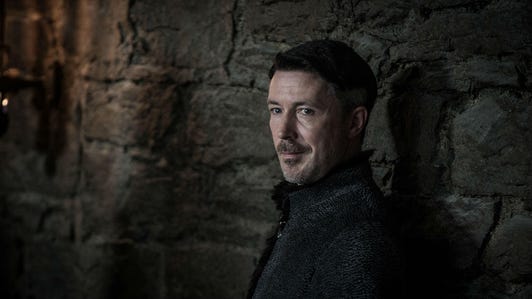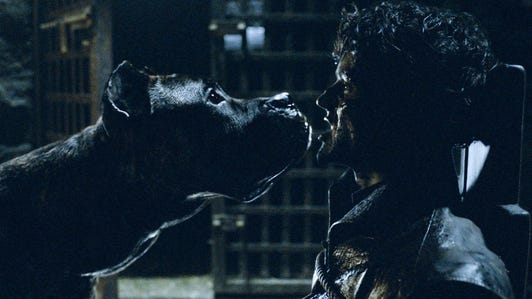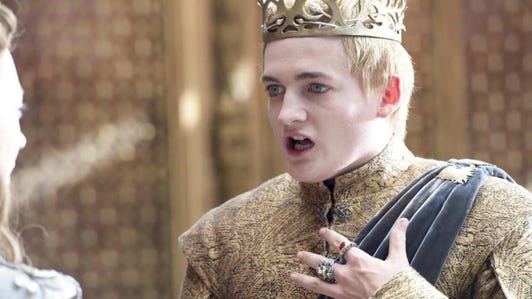
Heavy is the head that wears the crown. The opening moments of HBO's House of the Dragon see Viserys Targeryen inherit enormous responsibility when he's crowned Ruler of the Seven Kingdoms. It's fitting that much of the show's first season, which debuts at 9 p.m. Sunday on HBO, revolves around a king struggling to live up to his predecessor. It's the precise burden shared by House of the Dragon itself, which has to follow one of the most celebrated TV shows of all time in Game of Thrones.
Only time, and the subsequent seasons it brings, will tell if House of the Dragon can scale that imposing wall. But after watching the first six episodes, it's clear House of the Dragon at least has a shot. It's excellent TV, a fantasy drama that doesn't require Game of Thrones fandom to enjoy.
Perhaps more importantly, House of the Dragon will give lapsed Game of Thrones fans reason to love again. That show's final season was controversial and polarizing. Where Game of Thrones ended up frenetic and at times unweildy, House of the Dragon puts fans back on more steady, solid Westeros ground.
The show starts 172 years before the death of "The Mad King" Aerys Targaryen and the birth of Daenerys. Chronicling the peak and ensuing fall of the Targaryen Dynasty, House of the Dragon is based on Fire and Blood, a volume of fictional history George R.R. Martin wrote on the Targaryens. Yep, Martin wrote a 900-page book on the Targaryens. Nope, we're never getting Winds of Winter.
Much of Game of Thrones centered on the combative houses of Westeros vying to become the dominant clan. In contrast, House of the Dragon is all about the internecine conflict generated by different Targaryens all laying claim to the same Iron Throne. It begins with such a contest. In the opening minutes of House of the Dragon, following the death of Jaehaerys, the Great Council holds a vote on succession that pits Prince Viserys against his cousin, Princess Rhaenys.
Viserys wins because the lords of Westeros won't accept a woman as ruler. That doesn't stop him, later in the opening episode, from naming his daughter Rhaenyra Targaryen as his successor. Viserys was evidently a progressive guy for his day -- but the situation is complicated when he remarries and his new wife gives birth to a son, Aegon. Viserys says the arrival of his son changes nothing, but an ominous question looms: If Viserys died, who in Westeros would support a woman's claim to the throne over a man's?
The relationship between Viserys and Rhaenyra is a highlight, in large part because of the actors that portray them. Paddy Considine is strong in his role as a decent man turned average king, a fellow who struggles to balance the needs of his family and Westeros simultaneously. But the shining star of House of the Dragon's opening episodes is surely Milly Alcock as Rhaenyra. She's got an enchantingly expressive face -- a simple squinting of the eyes or a pursing of the lips can betray the range of emotions that accompany king's court politics.
You'll notice, if you peruse House of the Dragon's Wikipedia page, that Alcock plays "young Rhaenyra Targaryen" -- she's one of two people who play the character. Where Game of Thrones went wide, spreading its focus among different families throughout the continent, House of the Dragon goes long. There are gaps of time in between episodes that vary from months to years. That makes sense, since the book it's based on spans 300 years of history, compared to the much shorter timespan depicted in Martin's A Song of Ice and Fire novels.
Even after six episodes of the show, House of the Dragon's scope is still mysterious. It's clearly building to The Dance of the Dragons, a Targaryen civil war that's famous in Ice and Fire lore. But when it gets there, and how much further the show delves into the 172 years of history that separates it from Thrones, is tantalizingly unclear.
The faster pace of House of the Dragon helps it feel different from Game of Thrones, which is helpful. Comparisons with Game of Thrones are unfair. Thrones was famous for complex characters, heartbreaking surprises and extravagant set-piece battles, each of which took years to build to. Fans who weren't disappointed by the show's controversial final season will have high expectations for House of the Dragon, and fans who were disappointed will demand something outstanding to win them back.
But as unfair as those comparisons are, they're also inevitable. As the first episode of House of the Dragons finished, I asked myself whether it was as captivating as Game of Thrones' first. I wondered if any character was as compelling as Ned Stark, or if politics within the king's small council would reach Littlefinger-versus-Varys levels of intrigue.
That changed halfway through the second episode. Instead of reminiscing about the Starks and the Lannisters, I became entirely focused on the Targaryens. House of the Dragon may never be the next Game of Thrones but, from the six hours I've seen, it looks poised to at least step out of the giant shadow its predecessor casts. That's an achievement any king -- or queen -- could crow about.









 Add Category
Add Category

